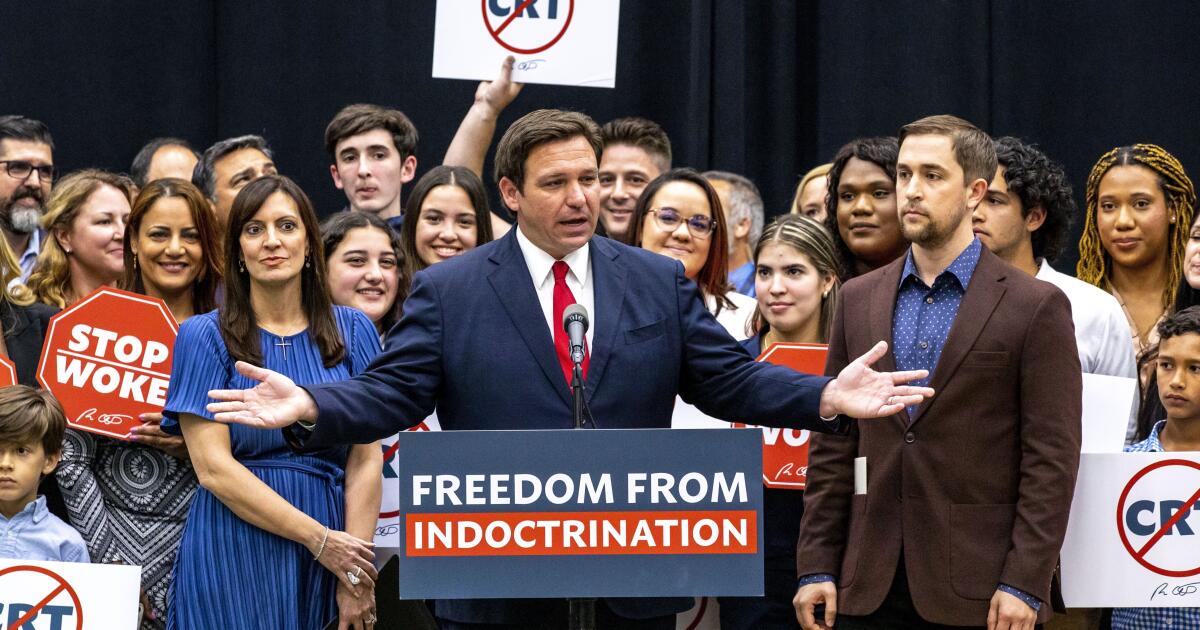Column: The truth about the Harvard president’s ouster
You may have heard during the last few days about the resignation by the president of a smallish university in New England.
Pundits, politicians and alumni are currently locked in a debate over whether Claudine Gay’s decision to step down after only a months-long tenure as president of Harvard was due to accusations that she was a serial plagiarist or her maladroit performance last month at a congressional hearing about a surge of antisemitism on American college campuses.
A few things about this: That some of Gay’s academic writings crossed the line into plagiarism is indisputable. That she, along with the presidents of the University of Pennsylvania and MIT, failed to knock the “gotcha” questions about antisemitism back down the throats of the cynical, preening Republican interrogators at the hearing is also indisputable.
The biggest story about higher education over the last decade has been increased politicization, not wokeness.
— Don Moynihan, Georgetown University
What’s important is that neither of those facts has anything to do with what was really behind the campaign to force Gay out of her job. To put it simply, the press has completely missed the real story. To be precise, the debate about her resignation has ignored the noxious context, which is a concerted attack on American higher education — indeed, all education — by a right-wing cabal.
Gay, whatever her faults, is clear-eyed about this context. In an op-ed published Wednesday, she warned that her case “was merely a single skirmish in a broader war to unravel public faith in pillars of American society.”
Such campaigns, she added, “often start with attacks on education and expertise, because these are the tools that best equip communities to see through propaganda. … Trusted institutions of all types — from public health agencies to news organizations — will continue to fall victim to coordinated attempts to undermine their legitimacy and ruin their leaders’ credibility. For the opportunists driving cynicism about our institutions, no single victory or toppled leader exhausts their zeal.”
What’s most shocking about the failure of the press to recognize what’s happening is that the leaders of the cabal are completely open about their goals and their methods. Here, for instance, is a manifesto by the odious Christopher F. Rufo, the leader of the braying mob that chased after Gay:
“We launched the Claudine Gay plagiarism story from the Right,” he stated on X-formerly-Twitter on Dec. 19. “The next step is to smuggle it into the media apparatus of the Left, legitimizing the narrative to center-left actors who have the power to topple her. Then squeeze.” This is a replication of his campaigns to turn “critical race theory” (CRT) and “diversity, equity and inclusion” programs (DEI) into dog whistles for the reactionary Republican voting bloc.
The problem is that all the focus is on Harvard, for at least a couple of reasons: It’s the most prestigious university in the country and lots of journalists at agenda-setting news organizations such as the New York Times are alumni, and thus believe that culture and society revolve around the place (or similar Ivy League institutions).
“The obsessive culture war coverage of the Ivies hurts other institutions,” observes Don Moynihan, a public policy professor at Georgetown University. Those elite private schools have the money and connections to survive whatever partisan politics throws at them.
Not so the public institutions that educate the vast majority of Americans. (Harvard’s enrollment, including its graduate and professional schools, is about 30,000; at Florida’s three main campuses, which are under intense partisan threat from Gov. Ron DeSantis, it’s a combined 185,000.)
“The biggest story about higher education over the last decade has been increased politicization, not wokeness,” Moynihan writes. “The biggest threats to speech are coming from people who write the laws and set the budgets, not from students. … University trustees in public institutions are increasingly political appointees determined to impose right wing values.”
He’s right. Yet coverage of the crisis in public schools pales in comparison to the obsessive reportage about Harvard and the Ivies.
The model for eviscerating the independence of public university systems was set by Republican Gov. Scott Walker of Wisconsin. By the end of his two terms in 2019, reported Karin Fischer of the Chronicle of Higher Education in 2022, “Walker had slashed college budgets, stripped tenure protections and university autonomy, and proposed gutting the Wisconsin Idea, enshrined in state law, that stresses higher education’s importance to the state and society.”
According to Barrett J. Taylor, the author of “Wrecked: Deinstitutionalization and Partial Defenses in State Higher Education Policy,” a book about the Wisconsin experience, “Walker went after higher ed to rally his base: ‘Universities were too liberal! Professors had too good of a deal!’ It was something to oppose. And higher ed is still a useful political tool.”
Other state universities were targeted by partisan activists. The University of North Carolina was bedeviled by conservatives on its Board of Governors claiming to find ideological bias campuswide. The board’s real agenda was to shut down progressive activities, which it did by closing a poverty law center at the main campus at Chapel Hill led by “a vocal critic of conservatives,” according to Inside Higher Ed, as well as an environmental science program and a center on social change at satellite campuses.
In December, Kevin Guskiewicz left his job as chancellor of UNC Chapel Hill to become president of Michigan State University. The mostly Republican board replaced him with Lee Roberts, a Republican functionary who had no experience running a major university.
At Texas A&M, conservatives influential within the university system interfered with the hiring of a distinguished journalist, Kathleen McElroy, to head its journalism school.
Over a period of weeks, the terms of her employment were reduced to a one-year non-tenured appointment from a tenured chair. The reason, McElroy was told by the university’s dean of arts and sciences, was that “you’re a Black woman who worked at The New York Times.”
The fiasco led to the resignation of A&M President Katherine Banks after a faculty meeting in which she defended the fiasco clumsily. McElroy chose to stay at the University of Texas and obtained a $1-million settlement from A&M over the altered offer.
Florida remains ground zero of the reactionary attack on public higher education. DeSantis has installed Ben Sasse, a former Republican senator from Nebraska, as president of the flagship University of Florida (enrollment: 60, 795); never mind that Sasse had zero experience running a major university.
The highlight (or lowlight) of DeSantis’ campaign against Florida universities involves New College of Florida, a Sarasota institution that possessed a well-deserved reputation as one of the nation’s outstanding havens for talented, independent-minded students. DeSantis fired its board of trustees and replaced it with a clutch of right-wing stooges including Rufo.
They promptly fired the college’s president and replaced her with Richard Corcoran, a former GOP state legislator, while nearly doubling his salary to $700,000, plus more than $200,000 in perks.
Corcoran moved to turn New College into a fourth-tier institution of zero distinction. He recruited 70 baseball players even though the campus has no playing fields. Existing students fled, and the average SAT and ACT scores and high-school grade point averages of the incoming class have plummeted.
That brings us back to Rufo and his campaign against Claudine Gay. Does any person past the age of playing with their toes really believe that he cares one whit about plagiarism and antisemitism, the ostensible rationales for her departure? Does anyone believe his purpose is to heighten the integrity of prose in academia, or ensure that university campuses remain refuges for pro-Israel policy?
Of course he doesn’t — at least not beyond using these issues to conceal his real goal, which is to make university administrators and faculty terrified of being caught allowing progressive thoughts into the classroom.
Here he was on Twitter, on March 15, 2021, at the height of his fabricated campaign against “critical race theory,” which became conveniently truncated as “CRT,” the better to put it over on rubes without explaining what it is:
“We have successfully frozen their brand — ‘critical race theory’ — into the public conversation and are steadily driving up negative perceptions. We will eventually turn it toxic, as we put all of the various cultural insanities under that brand category.”
“Brand category,” “negative perceptions.” … This is the language of advertising, not serious political discussion.
Having achieved his purpose by demonizing CRT, Rufo and his sycophants turned to DEI. Right-wing politicos unwilling or unable to even feign interest in making public policy scurried to get in front of this parade.
GOP legislators in Wisconsin held hostage $800 million in funding for the state university and blocked all staff pay raises unless the university cut back DEI programs. The university agreed. Oklahoma’s Republican governor, Kevin Stitt, signed an order defunding DEI departments in all state agencies, including the state’s 50 public university campuses.
Did anyone stop to inquire what it means to reverse DEI? The antonyms of diversity, equity and inclusion are uniformity, inequality and exclusion. In context, this translates into white supremacy. For who is on the outside looking in when the rules promote uniformity, inequality and exclusion? In our society, it’s everyone but whites — especially white males.
Of course, once you’ve reduced these principles to “DEI,” no one has to stop and think about meaning. But it’s no secret to those on the firing line. The assault on DEI programs, observed a report on Florida’s anti-DEI campaign by the American Assn. of University Professors, is “emblematic of how civil rights discourses get co-opted by the far right to promote misogynistic (and/or racist) agendas.”
Gay’s sloppiness in citing others’ words in her academic oeuvre was a dormant bomb, awaiting someone looking for a flaw in her record to light the fuse. That doesn’t mean that it fails to qualify as plagiarism; it does, according to Harvard’s own written standards.
Nor does it mean that her offenses would have necessarily prompted her resignation, if not for the miasma of ideological controversy stirred up by Rufo and his detestable henchwoman, Rep. Elise Stefanik (R-N.Y.).
It was Stefanik who set the rhetorical trap that Gay stupidly walked into at that Capitol Hill hearing, along with Penn President Liz Magill (who has also resigned, more directly as a result of a campus controversy over antisemitism) and MIT President Sally Kornbluth (who still has her job).
The sad truth is that plagiarism standards are dynamic, with punishment dependent on the prestige of the accused and the willingness of an institution to stand by them. As Timothy Noah of the New Republic has pointed out, Harvard faculty member Doris Kearns Goodwin committed arguably more egregious examples of plagiarism in 2002 and emerged with her employment and reputation intact, with Harvard’s help.
Rufo and Stefanik are taking victory laps over Gay’s resignation. Stefanik, who never lets an opportunity slip by to display crass vulgarity, tweeted “Two Down,” referring to Gay and Magill. Perhaps this incident will open people’s eyes to the dishonesty of their campaign and the hollowness of their triumph. Wouldn’t that be justice?







